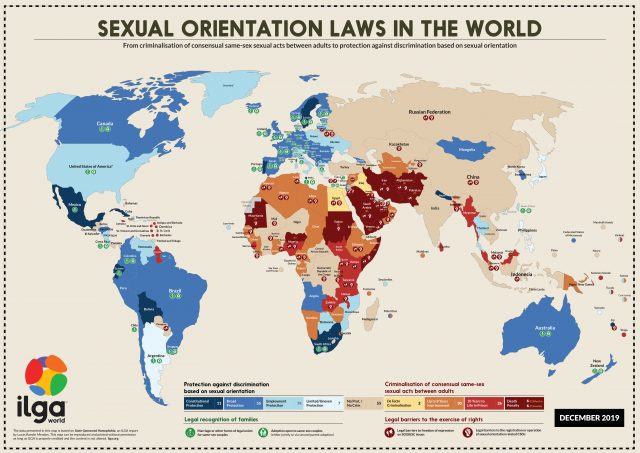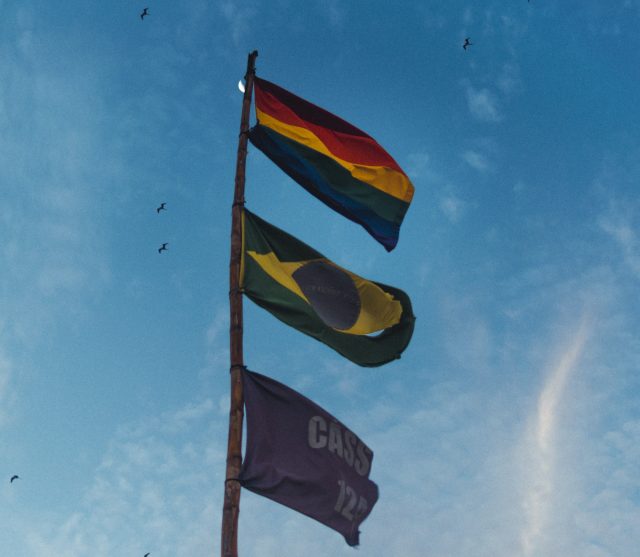Protections and rights for the LGBTQ+ community vary widely between the regions Teacher Horizons works in. While some countries—like Ecuador and South Africa—grant members of the queer community with constitutional protection, other parts of the world have conservative mindsets towards sexuality and gender roles which makes life extremely challenging for people who identify as LGBTQ+.
This situation is further complicated by international school environments which often stand apart from the traditional culture and values of the country they exist in as a result of the global mindset teachers and families bring to these communities. This can often lead to a clashing of different viewpoints on queer identities in schools, which can present difficult issues to navigate while attempting to support students.
Working as a LGBTQ+ educator in international schools presents unique challenges and opportunities given the range of perspectives and cultures different parts of the world maintain. Teacher Horizons values the diverse experiences of candidates which contribute to the exceptional diversity of international school communities.
But it is important to recognise that some members of the LGBTQ+ community may encounter discrimination in the sphere of international education given the large differences in attitudes towards sexual minorities or gender non-conforming people. To gain insights into this aspect of international education, Teacher Horizons sat down with several candidates who identify as gay, lesbian, and queer to share their experiences with our larger community.
At Teacher Horizons, we passionately believe in equal opportunities in the workplace, and it is encouraging to see that more international schools all over the world are taking a more progressive approach to hiring LGBTQ teachers. However, there is still a long way to go and unfortunately some governments are less open than others. We aim to challenge backward stereotypes and play our own part in making the world fairer and more open-minded, but we recognise that cultural changes take time to evolve.
Alex Reynolds
Protections and locations
For any international teacher, location is an important factor to consider when transitioning to a new school. Moving to a place with an interesting culture, or good travel opportunities ranks high on the list for educators eager to explore. But for LGBTQ+ educators, safety and legal protections must also be factored into that decision.
One Teacher Horizons candidate says, “Choose your location carefully, and by that I don’t just mean the choice of country I mean the location within that country.” Living in a larger city will likely mean a larger, more active queer community—though “large” is a relative term. For those who live in China, a city of nine million may not be considered large, and therefore may not have a larger queer community.
As a baseline, LGBTQ+ educators should research and understand the legal protections for their community. The International Lesbian, Gay, Bisexual, Trans and Intersex Association provides a number of resources for learning about sexual orientation laws in countries around the world, in addition to reports ranging on a number of topics relevant to the queer community.
Teacher Horizons’ community questions help teachers get a better understanding of school environments from the perspective of current and former educators from that school. These FAQs cover a range of issues, but one particular questions of interests asks, “Is the community accepting of LGBTQ+?” This resource can provide LGBTQ+ teachers with a starting point in how school communities value this diverse group of educators.
Very. We have LGBTQ+ members of staff and are preparing our curriculum and facilities to accommodate non-binary, trans, and gay students.
We have a very important Equal Treatments policy and do not tolerate discrimination of any kind. i.e., based on: gender, ethnicity, race, disability, religion or belief (including lack of religion or belief), sexual preference, age, special educational needs.
Representation matters
In some countries there are few opportunities for young queer people to see representation of LGBTQ+ adults in their communities. In these more conservative cultures, it may be challenging for adults to be out and proud, but it offers chances to support young people in the LGBTQ+ community.
Teacher Horizons wants to help celebrate LGBTQ+ educators and encourage schools to embrace the invaluable experiences and mindsets of the queer community. And our international advisors offer candid and transparent advice for candidates thinking of moving to a country when acceptance is not widespread, which candidates need to consider and follow up with research of their own.

As one candidate shares with Teacher Horizons: “Anyone moving…needs to consider if they are able to live with some of the challenges and lack of acceptance. At the same time, they should consider the opportunity it presents to support fellow LGBTQ in small but important ways.”
Another candidate shared her experiences supporting young people who are coming to terms with their multifaceted identities by serving as representation for these students. In many cases, LGBTQ+ students have come to her for advice and affirmation while navigating the challenges of growing up and learning about their sexual and gender identities.
Making the move: alone or with a partner?
One of the most challenging aspects of teaching overseas stems from the challenges to secure a visa for partners in countries where same-sex marriage is not recognized. Schools in countries where this is the case may not be able to guarantee residency for couples who don’t fall into the category of a traditional marriage.
For one Teacher Horizons educator, Ho Chi Minh City proved to be the ideal place to move because she and her partner were both able to secure a visa. While Vietnam recognizes same-sex marriages, unfortunately this law only extends to couples who wed outside of the country, where same-sex marriage is legal.
From her experience, she has observed significant progress within the international education community for queer educators. And while she has witnessed some discrimination by a small minority of individuals, the vast majority of the school stands in support of LGBTQ+ educators and students.
Teachers not moving with a partner can choose whether or not to divulge information about their sexual orientation to their schools. This opportunity for transparency with a school offers educators the chance to ask questions about situations they might encounter in that country.

As LGBTQ+ advocates work to secure better rights in countries across the world, international education will also shift towards a more inclusive mindset. Though if schools hope to continue embracing internationalism, they need to embrace this sphere of diversity as well.
Teacher Horizons remains committed to supporting LGBTQ+ educators thrive in teaching experiences that value their identify and celebrate the totality that queerness embodies.



